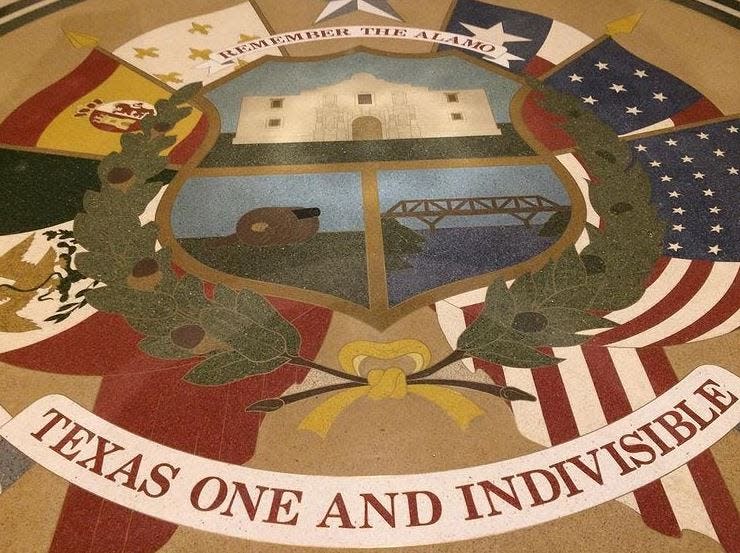Texas Nationalist Movement wants secession vote during 2024 state Republican primary
AUSTIN — An organization called the Texas Nationalist Movement has submitted more than 139,000 petition signatures to the state Republican Party seeking to place a referendum on the March primary ballot calling for Texas to secede from the United States.
While supporters of an effort that has been something of a pipe dream in certain conservative circles for several years argue that secession is an option under the Texas Constitution, a U.S. Supreme Court ruling handed down four years after the Civil War makes it clear that Texas, like all states had "entered into an indissoluble relation" when it was admitted to the Union in 1845.
But Daniel Miller, president of the Texas Nationalist Movement, said in a video on his organization's website that secession is legal and he questioned whether the state's founders, if they were alive today, would have even wanted statehood.

"Imagine for a moment that Texas was already a self-governing independent nation, like almost 200 around the world right now, and if we were to ask ourselves if we wanted to join the union — knowing everything we know about the federal government right now," Miller said. "Well, if we wouldn't vote to join them, why would we ever tolerate staying one moment longer than we had to."
James Wesolek, a spokesman for the Texas GOP, said party officials are in the process of verifying the petition signatures in advance of including the nonbinding referendum on the primary ballot. The threshold for a ballot initiative is about 98,000 valid signatures from people registered to vote in the state.
The state party platform adopted in 2022 states that "Texas retains the right to secede from the United States" and calls on the Legislature to put the matter to put the measure on the statewide ballot and allow the people to decide.
A secession resolution was offered during the 2021 Legislature but the measure was never brought up for consideration.
A leading Texas history scholar, however, said the matter is hardly that simple. Don Frazier, who heads the Texas Center at Schreiner University in Kerrville, said the Supreme Court's ruling in a case called White v. Texas is 1869, ruled that not only are states barred from unilaterally leaving the Union, the states that formed the Confederacy eight years earlier had done so without constitutional authority.
"The Constitution, in all its provisions, looks to an indestructible Union, composed of indestructible States," the high court said in an opinion written by then-Chief Justice Solomon P. Chase.
"The act which consummated (Texas') admission into the Union was something more than a compact; it was the incorporation of a new member into the political body. And it was final. The union between Texas and the other States was as complete, as perpetual, and as indissoluble as the union between the original States."
Frazier noted that in 1861, then-Texas Gov. Sam Houston warned the state not to secede, but when it did, he implored the Legislature not to join the Confederacy.
"Be a republic; don't be a confederate," said Frazier, paraphrasing Houston's sentiment at the time. "Do anything but join this train wreck that's now forming."
Miller said the movement he calls "Texit," named for the 2016 withdrawal of Great Britain from the European Union, is a response to what he sees as an overreach by leaders in Washington.
"(T)he majority recognizes that the states must step up against the federal government," he said. "And it’s the majority who recognize that the relationship between Texas and the federal government is broken, and it’s about time we gave the people of Texas a chance for their voice to be heard.”
John C. Moritz covers Texas government and politics for the USA Today Network in Austin. Contact him at jmoritz@gannett.com and follow him on X, formerly called Twitter, @JohnnieMo.
This article originally appeared on Corpus Christi Caller Times: Can Texas secede? 'Nationalist' group says yes, Supreme Court said no

